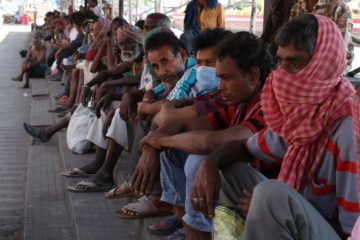Walk into any bar or restaurant in many of the world’s big cities and the only clue to your location is language.
Young people are the same whether they are in London, New York, Paris, Istanbul or dozens of other large, thriving cities. They are educated, liberal and tolerant.
But similarly visit Barnsley in South Yorkshire, Scranton in Pennsylvania, Hénin-Beaumont in north-east France or Central Anatolia and people there share many parallels too. They are everything their urban counterparts are not and more pessimistic about their prospects and politics.
Neither of these two groups are homogenous, but increasingly there is more similarity within the groups than within their nations.
Historically these two groups have found common political ground, but now this allegiance has split. The centre-left parties of urban liberals are in retreat, as the disillusioned working-class move to the more nationalist options of Brexit, Donald Trump, Marine Le Pen and Recep Tayyip Erdoğan.
This is not a phenomenon specific to Britain, the USA, France and Turkey, nor just to their megacities. Only 3.1 percent of people in Detroit, for example, voted for Mr Trump, while none of Manchester, Liverpool, Cardiff, Newcastle, Leeds, Edinburgh, Glasgow, Norwich, Brighton and Belfast voted for Brexit.
Much of this chasm is personified by the ongoing trial of Frenchman Cédric Herrou, which began on January 4 in Nice. Mr Herrou, an olive farmer but with more metropolitan propensities, is accused of – and does not deny – helping African migrants illegally enter France from Italy.
Hundreds of sympathisers are gathering outside the courtroom cheering Mr Herrou’s presence and even the prosector has praised his “noble” cause. And yet French presidential candidates are queuing up to crackdown evermore on migrants in light of Ms Le Pen’s electoral threat.
This is a clash of people divided by irreconcilable differences.
Mr Herrou and his ilk believe their values are not threatened by migration, because their values are immutable. His opponents believe their values are malleable and thus vulnerable to outsiders.
One group believes that, before they are of a nation, human beings are human beings. The other believes in borders and historically-defined cultural zones.
Populism is a nebulous term that has lost much meaning in recent overuse, but it is mainly a rhetorical device that focuses on “the people” and uses anti-elitism and/or outsider discrimination to foster insider favouritism. Even when there are no specific outsiders – for example, immigrants, African-Americans or Gülenists – there are always insiders, always a “we”.
The in-groups are now defined as much by how people think as by how they look, although excluding populism still finds plenty of time to do the latter.
British political commentator Nick Cohen wrote in January 8’s Observer newspaper that “nationalists hate enemies in their countries more than they hate the enemies of their countries”, but this contempt flows both ways, especially after 2016’s divisive votes in Britain and the USA.
Just as Ted Cruz tried to skewer Mr Trump during the Republican primaries because of his “New York values”, so did Hillary Clinton tell a Manhattan audience that half of Mr Trump’s supporters were “deplorables” characterized by sexism and racism.
In Britain too just as “Bremoaners” have replaced migrants as the tabloid press’ bête noires, so do many remain voters blame the EU referendum result on working-class ignorance, justified perhaps by education being the single biggest predictor of how people voted – fewer than 30 percent of those with a degree voted out.
The good news is that this makes the type of nation-versus-nation war that defined the 20th-century extremely unlikely. Not even Donald Trump is likely to launch full-scale military action against his own people.
The bad news is that, when how you behave, learn and think becomes the most important political issue of all, the harm is likely to be a lot more insidious.


